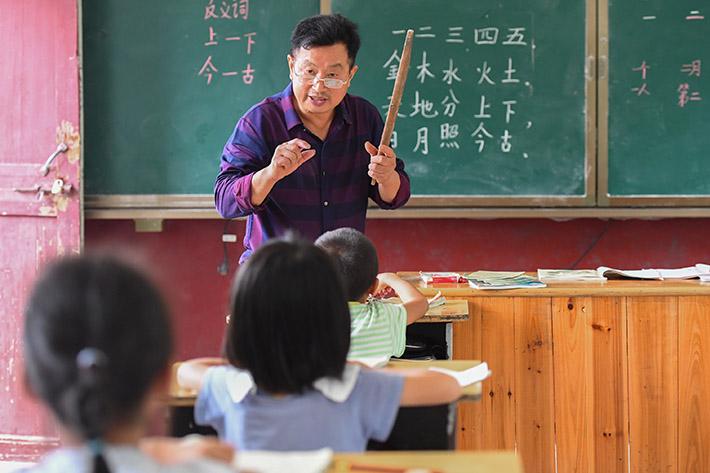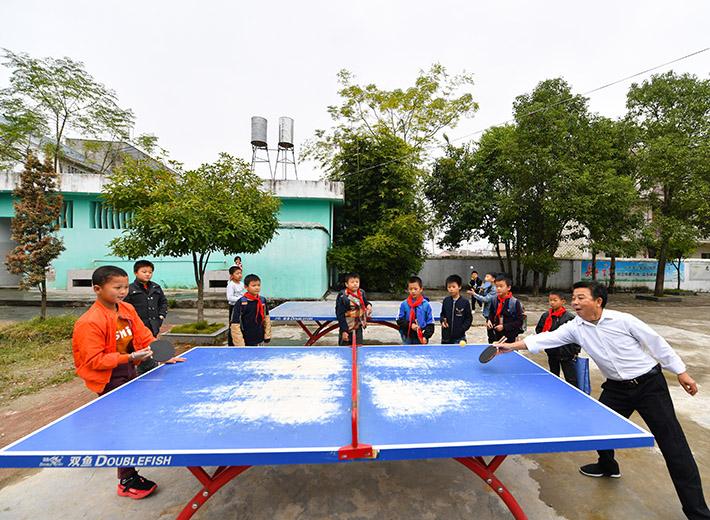
Dong Zhuwen, a 63-year-old retired teacher, teaches standard Chinese at a primary school in Huju Township, Zhuzhou City in Hunan Province, on 9 September 2020
Pang Caiyun, a 59-year-old retired teacher from Baiyin, Gansu Province in northwest China, chose to continue working after retirement. Four years ago, she went to teach at a rural primary school around 300 km away in Tianshui, another city in Gansu.
She is one of the teachers participating in the Silver-Age Teacher Plan, launched by the Ministry of Education in 2018 to encourage retired teachers to teach in rural schools to improve rural education.
The project is open to retired teachers and school principals under the age of 65, who are willing to teach in the countryside for at least one year.
In addition to teaching, they may also be asked to evaluate the work of other teachers, host open lectures or workshops on teaching, provide guidance and to help schools to improve their management.
Improving rural education
Pang signed up for the project immediately after seeing a recruitment notice issued by the local educational authorities. She told newspaper People’s Daily that, after she was accepted by the project, it took her eight hours to travel from Baiyin to Tianshui as she had to take three buses and one taxi.
When she first arrived at the school, she was shocked by how seriously understaffed it was, with just six teachers for a school with six grades and hundreds of children. While most elementary school teachers in China are responsible for teaching only one subject to one grade, each teacher at this understaffed school usually juggled multiple courses for different grades. She herself was assigned to teach both math and physical education for two grades.
What was more worrying was that the students were weak in math. “Most students hadn’t mastered the multiplication tables, and when asked questions, they often stayed silent,” Pang said.
She started by developing the students’ interest in learning. For instance, when teaching solid shapes, she would use cups, pencils and erasers as examples and when explaining what a solution was, she would mix sugar and water before the students’ eyes to make it easier to understand. After one year, the students’ scores had improved significantly.
Pang has an enthusiasm for rural education because she herself is from a rural area. “When I was young, few girls had the opportunity to attend school. I had been lucky to be able to go to school and education has changed my life,” she said. She continued that she wants to contribute to rural education to enable more children to change their fate through education like she did.
Many other retired teachers are also choosing to contribute to rural education. Wen Panxi, an official with the Gansu Provincial Education Department, told People’s Daily that the teachers recruited through the Silver-Age Teacher Plan are mostly from rural areas and have contributed to improving rural education and easing teacher shortages in these areas.
Between 2018 and the end of last year, the project had recruited more than 20,000 retired school principals and teachers across the country, contributing to promoting a balanced development of education between urban and rural areas. Recently, the Ministry of Education and Ministry of Finance issued a notice announcing the project will recruit 6,000 teachers this year.
According to a new action plan regarding the project, issued on 30 August by the Ministry of Education and 10 other departments, in about three years, the number of retired teachers hired under the project will reach 120,000, who will teach either online or offline.
Local governments are introducing favourable policies to attract more retired teachers to work in rural areas. Zhoushan, a coastal city in Zhejiang Province in east China, is offering higher pay to retired teachers than other places. Retired teachers with senior professional titles are being offered a salary of 150,000 yuan ($20,577) to 200,000 yuan ($27,436) a year. The city’s education authorities are also offering to reimburse travel expenses for teachers to return to their hometowns twice a year. Last year, the city recruited 22 teachers from across the country to teach on its remote islands.
In addition to the higher pay, the city’s beautiful natural scenery is also a big draw for retired teachers. Zhoushan is the only prefecture-level city in China established on a group of islands, the Zhoushan Archipelago. The city is famous for its scenic beauty, seafood and Buddhist temples.
Jiang Yu, a retired high school math teacher in Tongwei County, Gansu, was one of the teachers recruited to teach in the rural area of Zhoushan. He was employed in Liuheng, a township on an island in Zhoushan, more than 2,000 km from his hometown.

Dong Zhuwen, a 63-year-old retired teacher, teaches standard Chinese at a primary school in Huju Township, Zhuzhou City in Hunan Province, on 9 September 2020
Valuable resources
According to a report published by the National Health Commission in 2021, the number of people aged above 60 and 65 had reached 264 million and 191 million in China, respectively, as of 1 November 2020, accounting for 18.7 percent and 13.5 percent of the population.
Data collected by the National Bureau of Statistics during the seventh national population census, released in May 2021, showed that the level of education of senior citizens had improved. Of those aged above 60, 13.9 percent had received a high school education or above as of 1 November 2020, up 4.98 percentage points from 2010.
The proportion of professionals among the senior population will increase in the future and it’s important to make use of these valuable human resources.
“Many retired teachers have rich teaching experience and are in good health, so they are capable of teaching in rural schools,” Xiong Bingqi, director of the 21st Century Education Research Institute, said in a commentary on the Silver-Age Teacher Plan published in the Guangming Daily newspaper in August. “The plan can not only meet rural schools’ demand for excellent teachers, but also help to improve the overall calibre of rural teachers.”
In addition to continuing to implement the Silver-Age Teacher Plan, Xiong suggested increasing spending on rural education to improve teachers’ working environment and treatment. “This way, more young teachers will be attracted to rural schools to close the compulsory education gap between urban and rural areas and inject new vitality into rural education.”